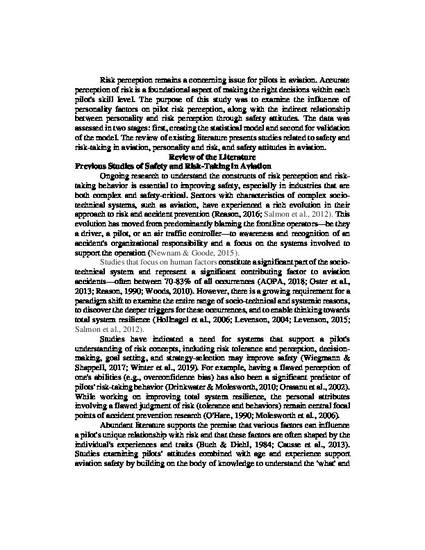
Objective: The purpose of the current study was to assess the influence of personality traits on safety attitudes and risk perceptions. Background: The ability to accurately assess risk remains a focal point of aviation training. This research seeks to understand if safety attitudes serve as a mediator. Method: Using a sample of 2,857 pilots, a statistical model was created through two independent stages. In stage 1, approximately 50% of the data were used to create the model using structural equation modeling techniques, and in stage 2, the model was independently validated. Results: The findings indicated that personality factors positively influenced risk perception, whereas personality increased, so did the pilot's perception of the risk level. Self-confidence was negatively related to risk perceptions, indicating that a pilot's self-confidence increases their perception of risk decreases. Additionally, self-confidence was a significant mediator to the relationship between personality factors and risk perception. Conclusion: The original scales had some validity issues, but the re-specified model provided some meaningful findings, especially in the relationships between personality traits, self-confidence, and risk perception. The model explained 26.4% of the variance in self-confidence and 9.5% of risk perception variance. Application: The findings highlight the importance for pilots to be aware of how increased self-confidence may influence their perceptions of risk. As pilots gain experience and self-confidence, care needs to be given to ensure greater risks are not taken, offsetting the value of the experience and self-confidence.
The authors would like to thank the Aircraft Owner's and Pilot's Association's (AOPA) Air Safety Institute (ASI) for supporting this research project and assistance in data collection.
Available at: http://works.bepress.com/joseph_r_keebler/111/
